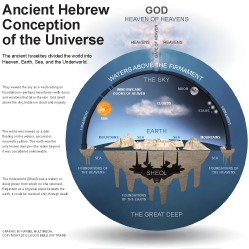12:1–10 In this section Paul talks about visions and revelations. He tells about a man who was taken up to paradise (2 Cor 12:2–4). Paul is probably referring to himself in the third person here (v. 6). He then discusses his thorn in the flesh (see v. 7 and note). He asked God to remove it, but God did not so that Christ’s power would be made evident in Paul’s weakness (vv. 8–10). |
12:1 visions Via a vision (optasia in Greek), prophets could see God’s plan for the future. These visions also revealed what was happening (or would happen) in the spiritual world. Here, Paul is uncertain whether he had a bodily or only a spiritual experience (v. 3).
revelations The Greek word used here, apokalypsis, refers to God’s unveiling information that was often previously unknown or concealed. In this instance, apokalypsis refers to God supplying Paul with information about his particular calling. At other times, it is used more broadly (see note on 1 Cor 14:6; compare note on Gal 2:2).
12:2 I know a man It appears that Paul is using the third-person voice to describe his own experience (2 Cor 12:6–10). He may have done this to avoid boasting; this may have also been typical of prophetic literature. (If Isaiah penned his own account of his vision in Isa 6, then he would have been speaking in the third person.)
in Christ To be in union with Christ, to have a relationship with Him. In this scenario, Paul indicates that the man, who is likely him, was in Christ’s presence while having his vision.
fourteen years ago This event happened sometime between ad 41–43 depending on the precise date of 2 Corinthians.
Event | Approximate Date |
Paul’s conversion | ad 33 |
Paul’s vision of heaven (if the account is about him) | ad 41–43 |
Paul founds the church at Corinth | ad 49 |
Paul pens 1 Corinthians | ad 54–57 |
Paul pens 2 Corinthians | ad 55–57 |
third heaven Refers to the highest heaven (1 Kgs 8:27; 2 Chr 2:6; Psa 148:4). Paul’s reference is probably intentionally vague, and it may simply serve to contrast the place where God and heavenly beings dwell against the place where people dwell (earth). If Paul does have a precise place in mind, then he probably is thinking of the third heaven as the highest heaven and the place of God’s presence.
(1 Kgs 8:27; 2 Chr 2:6; Psa 148:4). Paul’s reference is probably intentionally vague, and it may simply serve to contrast the place where God and heavenly beings dwell against the place where people dwell (earth). If Paul does have a precise place in mind, then he probably is thinking of the third heaven as the highest heaven and the place of God’s presence.
12:3 in the body or apart from the body Paul expresses uncertainty about whether the man was in his physical body during this experience. The man, who is likely Paul, may have been literally taken into heaven and then returned to earth, or he may have simply undergone a spiritual or mental experience. In Acts 9:1–9, Paul clearly experienced Christ bodily. There, Christ came to him on earth; here, Paul went to Christ in heaven (at least spiritually, and possibly also physically).
12:4 he was caught up This is typical prophetic language for the work of the Holy Spirit temporarily taking over someone’s life to give him or her a vision or revelation. The prophet Ezekiel used similar language (Ezek 2:2; 3:14; 8:3). See 1 Thess 4:17 and note; compare note on 2 Cor 12:2, and note on v. 1.
paradise Probably refers to the highest heaven (see note on v. 2).
12:5 of such a person Likely refers to Paul. Alternatively, Paul could be telling the story of another Christian convert. If Paul is referring to himself, he makes the switch back to the first person here; in doing so, he emphasizes that his authority came from God, not from his own decisions or persuasiveness. Paul can boast on behalf of what God did for him in Christ, not in who he is. See note on v. 2.
my weaknesses Refers to Paul’s hardships in ministry (11:23–29) and his forthcoming reference in v. 7.
12:6 I want to boast See note on 1 Cor 1:31.
hears anything from me If the events described in 2 Cor 12:1–5 happened to Paul, then here he reveals his motivation for not speaking about this experience directly in the first person: He does not want others to view him as special or elite.
12:7 extraordinary degree of the revelations Probably refers to the exceptional number or quality of revelations that caused Paul to become prideful.
was given The use of the passive verb indicates that Paul considered God to be responsible for the thorn because it was ultimately used for good.
a thorn May refer to Paul’s inner emotional turmoil about the churches (2:4), an ongoing sin, his opponents (like the so-called super-apostles; 11:1–5), a physical ailment (such as poor eyesight), his speaking ability (10:10), or demonic opposition (both in general or specific to him, as in 1 Thess 2:18). All of these options seem possible considering circumstances in Paul’s life.
a messenger Since the Greek word used here is angelos, which may be translated as “angel,” this may be a reference to an evil being. It also is possible that angelos references a human opponent who caused him great pain (compare 2 Cor 2:5).
of Satan By using the term Satanas, Paul likely has in mind the evil being that is the antithesis of God’s work in the world (see 4:4). While it is unclear whether Paul associated the thorn with a human messenger or a spiritual being, he explicitly identifies it with the figure of Satan. Satan’s involvement suggests that Paul may have considered the figure to function as an unwitting agent of God’s discipline. Satan intends to harm Paul, but God ultimately prevails in Paul’s life by displaying His power when Paul submits to the sufficiency of God’s grace.
12:8 Three times Echoes the number of times Jesus asked the Father to keep Him from suffering on the cross (Mark 14:32–42). Paul emphasizes that he has pled his case before God and that God has chosen to allow this experience to continue. Paul believes God will use it for good.
12:9 grace In this context, the Greek word used here, charis, refers to Christ’s power to help Paul endure hardship, be strengthened when struggling (physically, mentally, or spiritually), or experience forgiveness.
power is perfected in weakness Weakness provides the opportunity for God to show His power. For this reason, Paul can boast about his weaknesses even though others may mock him (see 10:10).
12:10 whenever I am weak, then I am strong Paul restates the paradoxical nature of his life and ministry. When he is helpless and vulnerable, Christ empowers him to endure and fulfill his vocation.
12:11–21 Paul concludes his defense against the so-called super-apostles. He asserts that he has performed the signs of an apostle and reiterates that he was not a burden to the Corinthian church (vv. 12–13). He continues to emphasize that he will not receive payment from them as he prepares to visit them a third time (vv. 14–16). He claims that neither he nor his companions took advantage of them but preached Christ in order to build up the believers at Corinth (vv. 17–19). |
12:11 a fool See note on 11:1, and note on 1 Cor 11:17.
I am in no way inferior Paul listed his hardship as evidence of his “worth” as an apostle.
preeminent apostles See note on 2 Cor 11:5.
12:12 patient endurance Refers to the ability to endure hardships and persecutions in ministry (compare 6:4).
signs of an apostle The phrasing suggests that an apostle could be recognized as such by the God-given ability to perform certain miraculous signs. It also suggests the existence of a class of individuals known as “apostles” separate from the Twelve (see Acts 6:2). These signs affirm Paul’s identity in contrast with the false apostles who are causing problems at Corinth (2 Cor 11:13).
signs and wonders and deeds of power Refers to mighty deeds performed as part of God’s work of salvation. The signs and wonders that accompanied Paul’s ministry demonstrated that he was in continuity with God’s work to redeem humanity (Exod 3:20; 10:1–2; Deut 4:34; Psa 105:27–36; Acts 7:36). See 1 Cor 12:9–11 and note.
12:13 not a burden to you See note on 2 Cor 11:9.
Forgive me this wrong Paul is either being sarcastic or merely asking for forgiveness for the sake of making peace. He did not wrong the Corinthians; he founded the church, and taught them the gospel as Jesus taught it.
12:14 this third time Paul first visited Corinth during his second missionary journey (Acts 18:1–18). He refers to his second visit there as the painful visit (2 Cor 2:1).
I am not seeking your possessions The wealthy believers in Corinth wanted to become Paul’s patrons—supplying financial support to him (see v. 13). See note on 1:12; compare 1 Cor 4:15, where Paul reminds them that their relationship to him is like children to their father—the father provides for them, not the opposite.
12:16 crafty Paul sarcastically addresses their concern to provide for him (2 Cor 12:14). Paul treats that idea as absurd and insists he would not take advantage of them. See note on 11:17.
12:17 have not taken advantage Paul stands in contrast to the “false apostle” (11:20).
(11:20).
brother Perhaps the same individual mentioned earlier; see note on 8:18.
12:19 your edification Unlike the false apostles who mistreated the Corinthian believers (11:13–15), Paul and his associates strengthen their faith and endure hardship for their sake. See note on 10:8.
12:20 gossip, pride, disorder The sins Paul lists echo the works of the flesh he listed in Gal 5:19–21. Such vices are sins against the community and create division among believers.
 Humility Devotional
Humility Devotional
12:21 sexual immorality Paul addressed the issue of sexual immorality among the Corinthians in his previous letter. Compare 1 Cor 5:1–13.

|
About Faithlife Study BibleFaithlife Study Bible (FSB) is your guide to the ancient world of the Old and New Testaments, with study notes and articles that draw from a wide range of academic research. FSB helps you learn how to think about interpretation methods and issues so that you can gain a deeper understanding of the text. |
| Copyright |
Copyright 2012 Logos Bible Software. |
| Support Info | fsb |
 Loading…
Loading…




